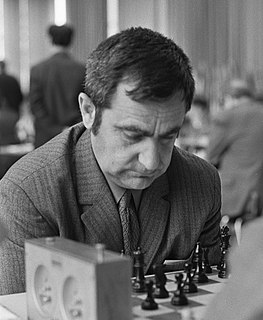Alexander Kazimirovich Tolush was a Soviet chess grandmaster. He was one of Boris Spassky's mentors. Tolush was born and died in Saint Petersburg. He earned the title of International Master (IM) in 1950, Grandmaster (GM) in 1953, and International Master of Correspondence Chess (IMC) in 1965.

Arthur John Roycroft is an English chess endgame study composer and author.

British Chess Magazine is the world's oldest chess journal in continuous publication. First published in January 1881, it has appeared at monthly intervals ever since. It is frequently known in the chess world as BCM.
The Dutch Chess Championship was officially established in 1909, although unofficial champions stretch back to the 1870s.

Jana Bellin is a British, formerly Czechoslovak chess player. She was awarded the Woman International Master chess title in 1969 and the Woman Grandmaster title in 1982.

Bruno Parma is a Slovene-Yugoslavian chess player and Grandmaster.
James Macrae Aitken was a Scottish chess player. Aitken was born in Calderbank, Lanarkshire, Scotland. In 1938 he received a PhD from Edinburgh University on the topic of 'The Trial of George Buchanan Before the Lisbon Inquisition'.

Baruch Harold Wood OBE, generally known as B. H. Wood, was an English chess player, editor and author. He was born in Ecclesall, Sheffield, England.

István Bilek was a Hungarian chess grandmaster. He was a three-time Hungarian Chess Champion.
Jaroslav Šajtar was a Czech chess master and an honorary grandmaster, born in Ostrava.

Győző Victor Forintos was a Hungarian chess player and by profession, an economist. He was awarded the titles International Master, in 1963, and Grandmaster, in 1974, by FIDE.
Miguel Cuéllar Gacharná was a Colombian chess master.

Lodewijk Prins was a Dutch chess player and referee of chess competitions.
David Vincent Hooper, born in Reigate, was a British chess player and writer. As an amateur, he tied for fifth place in the 1949 British Championship at Felixstowe. He was the British correspondence chess champion in 1944 and the London Chess Champion in 1948. He played in the Chess Olympiad at Helsinki in 1952.
Kaarle Sakari Ojanen was a Finnish chess player. Born in Helsinki in 1918, he became a Finnish National Master in 1938 and was the leading Finnish player between Eero Böök and Heikki Westerinen. He was perhaps best known for defeating world championship candidate, grandmaster Paul Keres, at Helsinki, 1960.
George Steven Botterill is a Welsh chess player, writer and philosopher.

Nikola Bochev Padevsky is a Bulgarian chess Grandmaster.

Francisco José Pérez Pérez was a Spanish/Cuban chess player. Born in Vigo, Spain, he won the Spanish Chess Championship in 1948, 1954, and 1960. He played for Spain in the Chess Olympiads of 1958 and 1960 and in the 1961 European Team Chess Championship.

André Chéron was a French chess player, endgame theorist, and a composer of endgame studies. He lived in Switzerland for many years. He was named a FIDE International Master of Chess Composition in 1959, the first year the title was awarded.

Libro de la invencion liberal y arte del juego del axedrez is one of the first books published about modern chess in Europe, after Pedro Damiano's 1512 book. It was written by Spanish priest Ruy López de Segura in 1561 and published in Alcalá de Henares.












